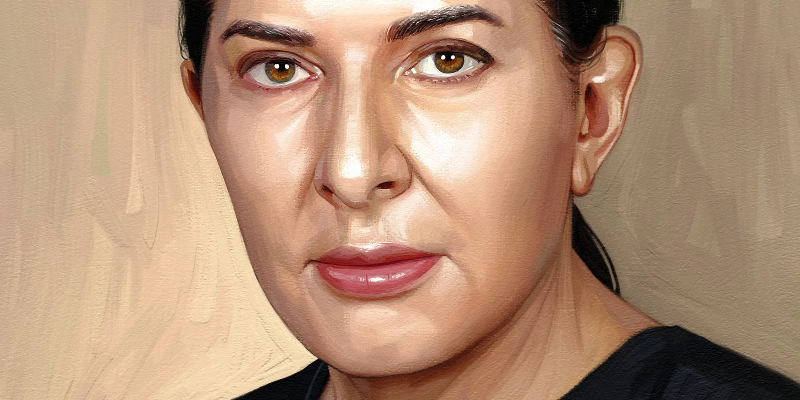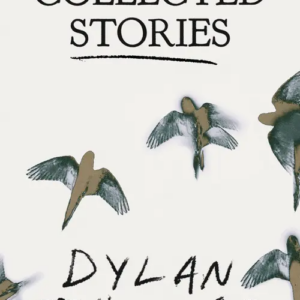Marina Abramović on Her Expansive View of Art-Making
This Week on the Talk Easy Podcast with Sam Fragoso
Illustration by Krishna Bala Shenoi.
Talk Easy with Sam Fragoso is a weekly series of intimate conversations with artists, authors, and politicians. It’s a podcast where people sound like people. New episodes air every Sunday, distributed by Pushkin Industries.
*
Marina Abramović is a pioneer in the field of performance art, using her body as both the subject and the medium. On this episode, we return to our special conversation with the legendary performer from her New York City apartment.
We start with her healing installation in Ukraine, creating art out of hardship, a Rainer Rilke poem that shaped her childhood, and the curiosity that propels her forward in the face of sexist attacks from the press.
On the back-half, Marina reflects on her groundbreaking work in Rhythm 0, her tolerance for pain, the deep-seated influence of her mother, finding happiness at age 76, how her seminal piece The Artist Is Present lives on, and what it means to be still, together.
Subscribe and download the episode, wherever you get your podcasts!
From the episode:
Sam Fragoso: How much of your work comes from a place of guilt?
Marina Abramović: Not much, actually. Lots of the work comes out of missing love, loneliness, a broken heart, unhappiness, some drama. Generally, if you look at the history of art, not too much art comes from happiness. You need a kind of push into something that is different from your tranquil life. It’s always been my old theory that if you have a great childhood, it’s difficult to become a good artist. If you have a difficult childhood, you have so much to work with. My body is the center of my work, pushing mental and physical limits. But also, nobody knows how a brain works. We think that we have 30% working, but scientists just developed a theory that we only have 20% working—
SF: Some people seem to have less than 20%.
MA: [Laughs] I’m sure. But if I take my body’s universe, it has endless exploration. In my early period of work, I really was pushing my physical limits. Now, I’m so much more interested in the brain and mental limits, which is so much harder. I’m not that interested in work about guilt. I think it’s so much more important to expand consciousness and see things in a big view.
SF: There’s a piece of poetry that you discover in your childhood that informs The Artist Is Present. It comes from Rainer Maria Rilke. It goes:
Earth, isn’t this what you want: to arise within us, invisible? Isn’t it your dream to be wholly invisible someday?–O Earth: invisible! What, if not transformation, is your urgent command?
Article continues after advertisement
MA: This is so incredible. Rilke is my big love. This is related to the Great Wall that I walked together with Ulay, each of us 2,500 kilometers to come to the middle and say goodbye. One of the reasons we wanted to do this was because NASA reported that the only visible, human-made constructions on our planet that could be seen from the moon and outer space were the pyramids and the Great Wall of China. Before NASA, before satellites, before anything— a 2nd century poet named Huang Xiang said, “The earth is small and blue. I am a small crevice in it.” From Confessions of the Great Wall. I mean, how do you explain this complete astrovision, of somebody looking from up into the earth in the 2nd century?
__________________
Since the beginning of her career in Belgrade during the early 1970s, Marina Abramović has pioneered performance art, creating some of the form’s most important early works. Exploring her physical and mental limits, she has withstood pain, exhaustion, and danger in her quest for emotional and spiritual transformation. Abramović was awarded the Golden Lion for Best Artist at the 1997 Venice Biennale. In 2010, Abramović had her first major U.S. retrospective and simultaneously performed for over 700 hours in “The Artist is Present” at the Museum of Modern Art in New York. Abramović founded Marina Abramović Institute (MAI), a platform for immaterial and long durational work to create new possibilities for collaboration among thinkers of all fields.
Sam Fragoso is the host of Talk Easy with Sam Fragoso, a weekly series of conversations with artists, activists, and politicians. His writing has appeared in The Atlantic, Vanity Fair, and NPR. After conducting seminal interviews with icons like Spike Lee, Werner Herzog, and Noam Chomsky, he independently founded Talk Easy in 2016.




















